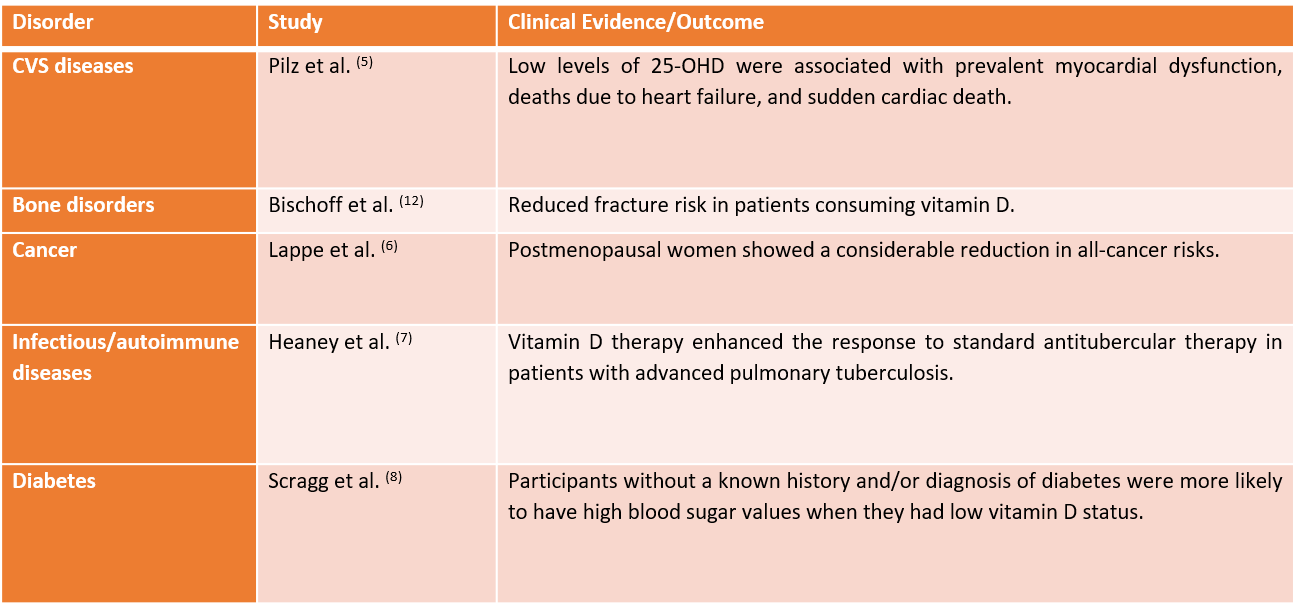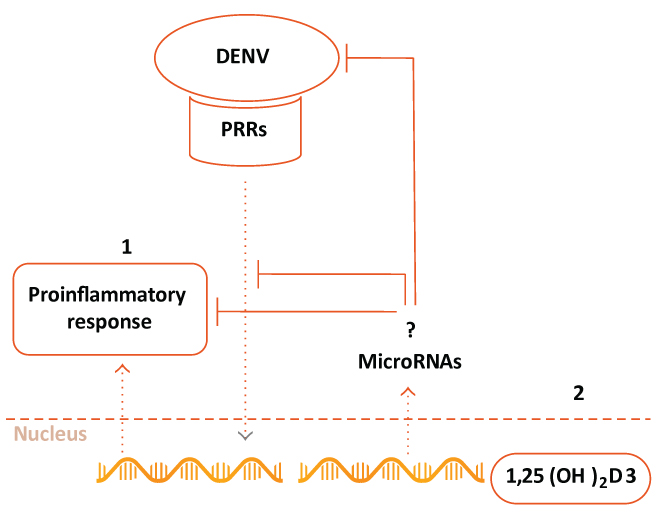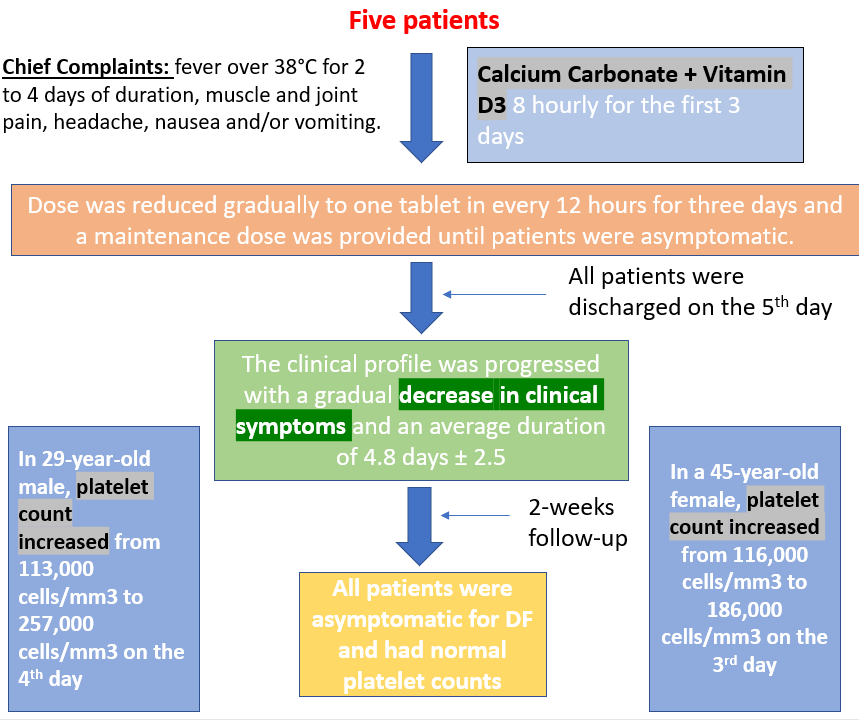Growing
evidence has underlined the critical contribution of vitamin D in
regulating proinflammatory responses and protecting many infectious
pathogens as well as viruses. Host
nutritional status or micronutrient supplementation is a stronger
predictor of immunity. Pertaining to Dengue Virus (DENV) infection, its
adjuvant therapy could lower the likelihood of progressing from severe
forms of disease or will reduce disease severity in patients. This
article showcases the evidence-based significant role of Vitamin D in
the management of dengue fever (DF).
At present, there are no antiviral drugs available to fight DENV. If dengue is not treated right, the progression to severe dengue is potentially fatal; it depends on multiple factors involving the virus and the host. Thus, drugs that are developed against DENV should not only have antiviral activity but should also be able to control the host inflammatory response involving cytokines to prevent subsequent vascular leakage, a characteristic of severe dengue. Newer studies are highlighting Vitamin D as a potentially useful compound that affects the disease process of dengue by altering immune responses.
A study estimated that globally, about 1 billion people are vitamin D deficient i.e. 25-hydroxy vitamin D (25-OHD) less than 50 nmol/L or vitamin D insufficient i.e. 25-OHD less than 75 nmol/L. Contrary to the assumption that vitamin D deficiency will never be a concern among Indians, a high prevalence of vitamin D deficiency was reported throughout the country in all age groups.
Relationship between 25-OH D Deficiency and a Variety of Chronic Diseases
Multiple studies have shown the various effects of vitamin D on the biological processes regulating calcium and phosphorus metabolism, effects on cell proliferation, differentiation, apoptosis, immune regulation, genome stability, and neurogenesis. Table. 1 reflects the clinical evidence and correlation of various chronic disorders with vitamin D deficiency.
Table. 1 Role of Vitamin D in chronic disorders and observed clinical evidence

Discussing the Potential Link of Vitamin D in Dengue Fever
As vitamin D showed a clinically significant role in managing various chronic infections, there are many observed clinical benefits of Vitamin D in treating dengue fever. Vitamin D3 is a potentially useful antiviral compound and is known to affect the disease process of dengue by changing the immune responses. Beneficial roles of vitamin D at the molecular levels are mentioned below:

Figure 1: Potential link among vitamin D and miR controlling dengue virus-induced inflammatory response and antiviral activity. Adapted from Arboleda et al. 1. DENV replication products and proteins are recognized by several Pattern recognition receptors (PRRs) whose signaling pathways promote the pro-inflammatory response. 2. Vitamin D activity activates transcription of miRs and other target genes that play a critical role in the control of inflammation-related signaling pathways and antiviral activity.
Insights into Vitamin D and Dengue Infection
There are various mechanisms that link DENV infections and Vitamin D. Here is the brief explanation showcasing the antiviral effect and immune response of Vitamin D in Dengue;
DENV cell exposure to 1,25-(OH)2D3:
The effect of vitamin D therapy on DENV cell exposure showed that 1,25(OH)2D3 resulted in a significant reduction of DENV-infected cells, a variable modulation of toll-like receptor 2 (TLR2) and TLR4, and reduced levels of secreted pro-inflammatory cytokines such as TNF-α, IL-6, and IL-1β after infection.
Monocyte-derived macrophages differentiation:
Some miRs (let-7a) pri-miR has multiple VDR/RXR binding sites that could potentially be regulated by vitamin D. miR let-7a belongs to a highly conserved family of miRs that contain other miRs which were previously reported in various studies to inhibit DENV replicative activity, such as let-7c. Beyond the members of the let-7 family, other miRs were also linked with the suppression of DENV infection and the inflammatory responses against the virus.
Clinical Response in Patients with Dengue to Oral Calcium + Vitamin D
Calcium is a vital constituent for clotting of platelet and regulating the immune response. With the oral intake of calcium plus Vitamin D3, free Ca2+ gets restored more rapidly by experiencing an early clinical improvement and the reduction of thrombocytopenia.
Sanchez V et al. reported a case study of 5 patients that determined the decrease in duration of signs and symptoms of dengue fever with the administration of oral calcium and Vitamin D3 as shown in Fig. 2 .

Fig 2. Clinical case study conducted by Sanchez V et al. to determine decrease symptomology in DENV with Vitamin D.
Comparison of Vitamin D Levels in Patients with Dengue Hemorrhagic Fever (DHF) and Dengue Fever (DF)
Mahmud MR et al. conducted a study to compare the level of vitamin D in patients of DHF and DF.
 Adapted from Mahmud MR et al. *independent sample t-test; # chi-square test
Adapted from Mahmud MR et al. *independent sample t-test; # chi-square test
1. Arboleda JF, Urcuqui-Inchima S. Vitamin D-Regulated MicroRNAs: Are They Protective Factors against Dengue Virus Infection? Adv Virol. 2016;2016.
2. Mahmud MR, Zaman S, Naseem N, Iqbal N, Tanveer N, Khalid MA, et al. Comparison of Vitamin D Levels in Patients with Dengue Haemorrhagic Fever and Dengue Fever. J Rawalpindi Med Coll [Internet]. 2018;22(2):92–5. Available from: http://www.journalrmc.com/index.php/JRMC/article/view/870
3. Jadhav NJ, Gokhale S, Seervi M, Patil PS, Alagarasu K. Immunomodulatory effect of 1, 25 dihydroxy vitamin D3 on the expression of RNA sensing pattern recognition receptor genes and cytokine response in dengue virus infected U937-DC-SIGN cells and THP-1 macrophages. Int Immunopharmacol [Internet]. 2018;62(July):237–43. Available from: https://doi.org/10.1016/j.intimp.2018.07.019
4. Tiwari P, Sharma N. Role of Vitamin D in Various Illnesses: A Review. J Pharm Care Heal Syst. 2017;04(03).
5. Pilz S, Tomaschitz A, Drechsler C, Dekker JM, März W. Vitamin D deficiency and myocardial diseases. Mol Nutr Food Res. 2010;54(8):1103–13.
6. Bischoff-Ferrari HA, Dawson-Hughes B, Willett WC, Staehelin HB, Bazemore MG, Zee RY, Wong JB. Effect of vitamin D on falls: a meta-analysis. Jama. 2004 Apr 28;291(16):1999-2006.
7. Lappe JM, Travers-Gustafson D, Davies KM, Recker RR, Heaney RP. Vitamin D and calcium supplementation reduces cancer risk: Results of a randomized trial (American Journal of Clinical Nutrition (2007) 85, (1586-1591)). Am J Clin Nutr. 2008;87(3):794.
8. Heaney RP. Vitamin D in health and disease. Clin J Am Soc Nephrol. 2008;3(5):1535–41.
9. Scragg R, Sowers M, Bell C. Serum 25-hydroxyvitamin D, diabetes, and Ethnicity in the Third National Health and Nutr ition Examination. Diabetes Care. 2004;27(12).
10. Giraldo DM, Cardona A, Urcuqui-Inchima S. High-dose of vitamin D supplement is associated with reduced susceptibility of monocyte-derived macrophages to dengue virus infection and pro-inflammatory cytokine production: An exploratory study. Clin Chim Acta [Internet]. 2018;478(October 2017):140–51. Available from: https://doi.org/10.1016/j.cca.2017.12.044
11. Sánchez-Valdéz E, Delgado-Aradillas M, Torres-Martínez JA, Torres-Benítez JM. Clinical Response in Patients with Dengue Fever to Oral Calcium Plus Vitamin D Administration: Study of 5 Cases. Proc West Pharmacol Soc. 2009;52(January 2009):14–7.
12. Arboleda Alzate JF, Rodenhuis-Zybert IA, Hernández JC, Smit JM, Urcuqui-Inchima S. Human macrophages differentiated in the presence of vitamin D3restrict dengue virus infection and innate responses by downregulating mannose receptor expression. PLoS Negl Trop Dis. 2017;11(10):1–18.
SAIN.VITD.19.12.1437
At present, there are no antiviral drugs available to fight DENV. If dengue is not treated right, the progression to severe dengue is potentially fatal; it depends on multiple factors involving the virus and the host. Thus, drugs that are developed against DENV should not only have antiviral activity but should also be able to control the host inflammatory response involving cytokines to prevent subsequent vascular leakage, a characteristic of severe dengue. Newer studies are highlighting Vitamin D as a potentially useful compound that affects the disease process of dengue by altering immune responses.
A study estimated that globally, about 1 billion people are vitamin D deficient i.e. 25-hydroxy vitamin D (25-OHD) less than 50 nmol/L or vitamin D insufficient i.e. 25-OHD less than 75 nmol/L. Contrary to the assumption that vitamin D deficiency will never be a concern among Indians, a high prevalence of vitamin D deficiency was reported throughout the country in all age groups.
Relationship between 25-OH D Deficiency and a Variety of Chronic Diseases
Multiple studies have shown the various effects of vitamin D on the biological processes regulating calcium and phosphorus metabolism, effects on cell proliferation, differentiation, apoptosis, immune regulation, genome stability, and neurogenesis. Table. 1 reflects the clinical evidence and correlation of various chronic disorders with vitamin D deficiency.
Table. 1 Role of Vitamin D in chronic disorders and observed clinical evidence

Discussing the Potential Link of Vitamin D in Dengue Fever
As vitamin D showed a clinically significant role in managing various chronic infections, there are many observed clinical benefits of Vitamin D in treating dengue fever. Vitamin D3 is a potentially useful antiviral compound and is known to affect the disease process of dengue by changing the immune responses. Beneficial roles of vitamin D at the molecular levels are mentioned below:
- It leads to the monocyte differentiation and T-cell activation by binding to vitamin D receptors and activating vitamin D-responsive genes in the body.
- Inhibits the cytotoxic T cell responses as well as T-helper 1 cell.
- Enhances responses of IL-10 and Th2 cytokine.

Figure 1: Potential link among vitamin D and miR controlling dengue virus-induced inflammatory response and antiviral activity. Adapted from Arboleda et al. 1. DENV replication products and proteins are recognized by several Pattern recognition receptors (PRRs) whose signaling pathways promote the pro-inflammatory response. 2. Vitamin D activity activates transcription of miRs and other target genes that play a critical role in the control of inflammation-related signaling pathways and antiviral activity.
Insights into Vitamin D and Dengue Infection
There are various mechanisms that link DENV infections and Vitamin D. Here is the brief explanation showcasing the antiviral effect and immune response of Vitamin D in Dengue;
DENV cell exposure to 1,25-(OH)2D3:
The effect of vitamin D therapy on DENV cell exposure showed that 1,25(OH)2D3 resulted in a significant reduction of DENV-infected cells, a variable modulation of toll-like receptor 2 (TLR2) and TLR4, and reduced levels of secreted pro-inflammatory cytokines such as TNF-α, IL-6, and IL-1β after infection.
Monocyte-derived macrophages differentiation:
- Monocyte-derived macrophages (MDM) that differentiate in the presence of 1,25(OH)2D3 are less susceptible to DENV infection and express lower levels of mannose receptor restricting binding of DENV to target cells.
- A study conducted by Giraldo et al. to determine the effect of oral vitamin D supplementation on DENV susceptibility and pro-inflammatory cytokine production in MDMs concluded that a supplement of 4000IU/day of vitamin D represents an adequate dose to control dengue progression and DENV replication.
Some miRs (let-7a) pri-miR has multiple VDR/RXR binding sites that could potentially be regulated by vitamin D. miR let-7a belongs to a highly conserved family of miRs that contain other miRs which were previously reported in various studies to inhibit DENV replicative activity, such as let-7c. Beyond the members of the let-7 family, other miRs were also linked with the suppression of DENV infection and the inflammatory responses against the virus.
Clinical Response in Patients with Dengue to Oral Calcium + Vitamin D
Calcium is a vital constituent for clotting of platelet and regulating the immune response. With the oral intake of calcium plus Vitamin D3, free Ca2+ gets restored more rapidly by experiencing an early clinical improvement and the reduction of thrombocytopenia.
Sanchez V et al. reported a case study of 5 patients that determined the decrease in duration of signs and symptoms of dengue fever with the administration of oral calcium and Vitamin D3 as shown in Fig. 2 .

Fig 2. Clinical case study conducted by Sanchez V et al. to determine decrease symptomology in DENV with Vitamin D.
Comparison of Vitamin D Levels in Patients with Dengue Hemorrhagic Fever (DHF) and Dengue Fever (DF)
Mahmud MR et al. conducted a study to compare the level of vitamin D in patients of DHF and DF.
- Study subjects: A total of 50 patients diagnosed with DF and fulfilling the inclusion criteria were enrolled in the study. The patients were divided into two groups having 25 participants each; one group had DF while the other DHF.
- Method: Vitamin D was assessed in host nutritional status by the chemiluminescence method. To compare the proportion of patients in each study group, Pearson’s Chi-square was applied. Relative Risk was determined along with a 95% confidence interval.
- Results: The results showed that the mean vitamin D levels in DF patients were higher (21.5 ± 13.6 ng/ml) as compared to DHF (12.4 ± 5.6 ng/ml). Independent sample test reflects that the difference was statistically significant (p=0.003), as shown in Table 2.
 Adapted from Mahmud MR et al. *independent sample t-test; # chi-square test
Adapted from Mahmud MR et al. *independent sample t-test; # chi-square test- The study concluded that Vitamin D has a significant role in the management of DF, and low levels of vitamin D could be associated with DHF.
- Adequately circulating 25-hydroxy (25-OH) vitamin D concentrations are required to be maintained for the functioning of the metabolic, immune, reproductive, muscular, skeletal, respiratory and cutaneous systems of men and women of all ages.
- Vitamin D has shown a significant role in managing Dengue fever with its antiviral and pro-inflammatory response.
- Additionally, Vitamin D led to a decrease in the duration of signs and symptoms of dengue fever and in preventing DHF.
1. Arboleda JF, Urcuqui-Inchima S. Vitamin D-Regulated MicroRNAs: Are They Protective Factors against Dengue Virus Infection? Adv Virol. 2016;2016.
2. Mahmud MR, Zaman S, Naseem N, Iqbal N, Tanveer N, Khalid MA, et al. Comparison of Vitamin D Levels in Patients with Dengue Haemorrhagic Fever and Dengue Fever. J Rawalpindi Med Coll [Internet]. 2018;22(2):92–5. Available from: http://www.journalrmc.com/index.php/JRMC/article/view/870
3. Jadhav NJ, Gokhale S, Seervi M, Patil PS, Alagarasu K. Immunomodulatory effect of 1, 25 dihydroxy vitamin D3 on the expression of RNA sensing pattern recognition receptor genes and cytokine response in dengue virus infected U937-DC-SIGN cells and THP-1 macrophages. Int Immunopharmacol [Internet]. 2018;62(July):237–43. Available from: https://doi.org/10.1016/j.intimp.2018.07.019
4. Tiwari P, Sharma N. Role of Vitamin D in Various Illnesses: A Review. J Pharm Care Heal Syst. 2017;04(03).
5. Pilz S, Tomaschitz A, Drechsler C, Dekker JM, März W. Vitamin D deficiency and myocardial diseases. Mol Nutr Food Res. 2010;54(8):1103–13.
6. Bischoff-Ferrari HA, Dawson-Hughes B, Willett WC, Staehelin HB, Bazemore MG, Zee RY, Wong JB. Effect of vitamin D on falls: a meta-analysis. Jama. 2004 Apr 28;291(16):1999-2006.
7. Lappe JM, Travers-Gustafson D, Davies KM, Recker RR, Heaney RP. Vitamin D and calcium supplementation reduces cancer risk: Results of a randomized trial (American Journal of Clinical Nutrition (2007) 85, (1586-1591)). Am J Clin Nutr. 2008;87(3):794.
8. Heaney RP. Vitamin D in health and disease. Clin J Am Soc Nephrol. 2008;3(5):1535–41.
9. Scragg R, Sowers M, Bell C. Serum 25-hydroxyvitamin D, diabetes, and Ethnicity in the Third National Health and Nutr ition Examination. Diabetes Care. 2004;27(12).
10. Giraldo DM, Cardona A, Urcuqui-Inchima S. High-dose of vitamin D supplement is associated with reduced susceptibility of monocyte-derived macrophages to dengue virus infection and pro-inflammatory cytokine production: An exploratory study. Clin Chim Acta [Internet]. 2018;478(October 2017):140–51. Available from: https://doi.org/10.1016/j.cca.2017.12.044
11. Sánchez-Valdéz E, Delgado-Aradillas M, Torres-Martínez JA, Torres-Benítez JM. Clinical Response in Patients with Dengue Fever to Oral Calcium Plus Vitamin D Administration: Study of 5 Cases. Proc West Pharmacol Soc. 2009;52(January 2009):14–7.
12. Arboleda Alzate JF, Rodenhuis-Zybert IA, Hernández JC, Smit JM, Urcuqui-Inchima S. Human macrophages differentiated in the presence of vitamin D3restrict dengue virus infection and innate responses by downregulating mannose receptor expression. PLoS Negl Trop Dis. 2017;11(10):1–18.
SAIN.VITD.19.12.1437

No comments:
Post a Comment